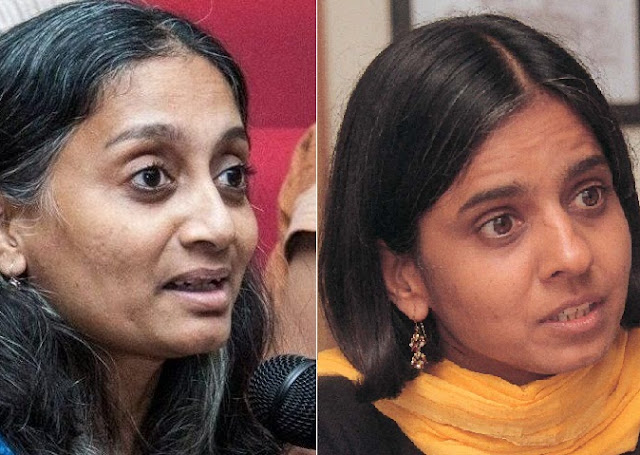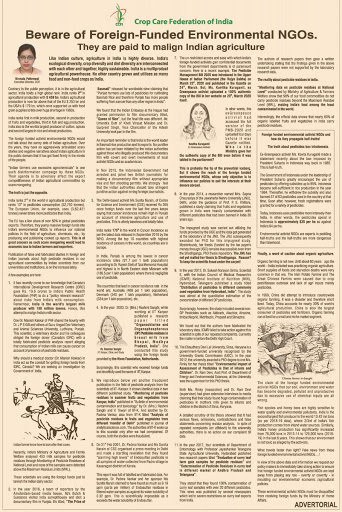By Our Representative
Written by Nirmala Pathrawal, executive director, CCFI, the advertorial seeks to attack “foreign funded environmental NGOs” for refusing to talk about “the sunny side of Indian agriculture”, adding, “Over the years, they have so aggressively articulated scary stories and negative narratives about Indian agriculture in the public domain that it has got focused firmly in the minds of the people.”
Calling the NGO allegation that Indian farmers use excessive agrochemicals “disinformation campaign”, the advertorial says, “Their agenda is to adversely affect the export competitiveness of Indian agricultural commodities by scare mongering.”
Among the scholars and activists, the advertorial sharply accuses well-known environmentalist Sunita Narain of the Centre for Science and Environment (CSE), based in New Delhi, for receiving Rs 265 crore foreign funds over the last five years in order to keep saying that “cancer in Punjab remain high on account of intensive agriculture and use of pesticides”, which is “utterly baseless and totally false.”
It also attacks ex-Greenpeace activist Kavitha Kuruganti – currently associated with a volunteer-driven informal network committed to Indian farmers’ rights, Alliance for Sustainable & Holistic Agriculture (ASHA) — for having “unrestricted access” to “confidential documents”, suggesting the type of access influence these NGOs have in the administration.
The advertorial criticizes “organic farming” which till about 50 years ago had led to “short supplies of foods” leading “starvation deaths” around the world, including India, insisting, “The Irish Potato Farming and the Great Chinese Famine were caused due to pest/disease outbreak and lack of agri inputs, mainly pesticides.”
The advertorial cites how in 1959 China attempted to introduce countrywide organic farming, but finding that it was a “disaster”, it abandoned it, claiming, “Today, China accounts for nearly 30% of world’s agricultural production” and is also “the largest consumer of pesticides and fertilisers.”
It underlines, “Organic farming can at best be a small and niche market segment. The claim of the foreign funded environmental activist NGOs that our soil, environment and water have become degraded, polluted and unproductive due to excess use of chemical inputs are all wrong.”
The rebuttal to the advertorial by 160 plus activists, scholars and NGOs follows a strongly-worded critique the advertorial by Kavitha Kuruganti, who in a blog addressed to the “Business Standard” editor, says, “CCFI might as well have accused the Prime Minister of India of scare-mongering then, when from the ramparts of the Red Fort on India’s Independence Day in 2019, he gave a clarion call to farmers to reduce and phase out agro-chemicals and save Mother Earth.”
 |
| Kavitha Kuruganti, Sunita Narain |
In their statement, activists, scholars and NGOs criticize “Business Standard”, stating the daily is liable for the advertorial’s “irresponsible content”, underlining, “The publication is not only violative of journalistic ethics and guidelines of the Press Council of India but also of its own code of conduct. It is not enough to offer as an excuse that the advertorial published was not its original content.”
“The modality of publication of this content is even more dangerous if it does not offer the opportunity to refute these allegations”, the statement insists.
Text:
We are writing to condemn and call out the full-page ‘advertorial’ commissioned by ‘Crop Care Federation of India’ (CCFI) and published in Business Standard newspaper dated 29 July 2020. The content of this advertorial is malafide as it seeks to promote harmful agricultural practices detrimental to public interest.
In fact, CCFI has dubious credentials as it is an industry body of chemical manufacturing companies. It seeks to serve their corporate agenda and profit making interests at the cost of health risks to the public. That it has chosen to subserve this agenda by maligning public image of several individuals and institutions in specific, and NGOs in general, is equally malicious.
The advertorial makes a targeted attack against reputed activists, scholars, scientists as well research institutions. It attempts to discount their years of public spirited work by presenting it in a scurrilous fashion. The wild accusations made against them are derogatory and liable for legal action under the defamation law.
The advertorial maliciously imputes ulterior motives to foreign funded institutions by suggesting that their work is detrimental to the interests of the nation. The NGO sector plays a very important role of supplementing government efforts towards the well-being of people.
NGO activities and their source of funding are also closely monitored by the Government through its various entities such as Charities Commissioners, Registrar of Societies, Income Tax Department and the Ministry of Home Affairs.
In this particular case, the organisations have been researching and raising awareness about harmful effects of agrochemicals based on solid scientific research. The organisations and individuals in question have been carrying on their research and other activities well within the framework of law and under full scrutiny of the system. To make such unwarranted allegations, as the advertorial does, is purely scandalous.
Lastly, the publisher, “Business Standard”, should share liability for this irresponsible content. The publication is not only violative of journalistic ethics and guidelines of the Press Council of India but also of its own code of conduct. It is not enough to offer as an excuse that the advertorial published was not its original content.
The publisher has presented itself as a national platform to amplify and propagate such content that has potential for huge public and personal damage. The modality of publication of this content is even more dangerous if it does not offer the opportunity to refute these allegations.
At a time when the government, civil society and media houses are taking initiative to counter fake news, it will only behove “Business Standard” to take responsibility for this editorial oversight.
We demand that the following action be taken for course correction for this publication:
- Business Standard should retract the advertorial from all its online editions with immediate effect.
- CCFI and “Business Standard” must publish an unconditional apology for this malicious advertorial. This apology should be published on prominently front page of the print edition and on all online editions of Business Standard.
- Press Council of India and other regulatory bodies should take strict action as per their norms and guidelines.
—
Click here for the list of those who have endorsed the statement

